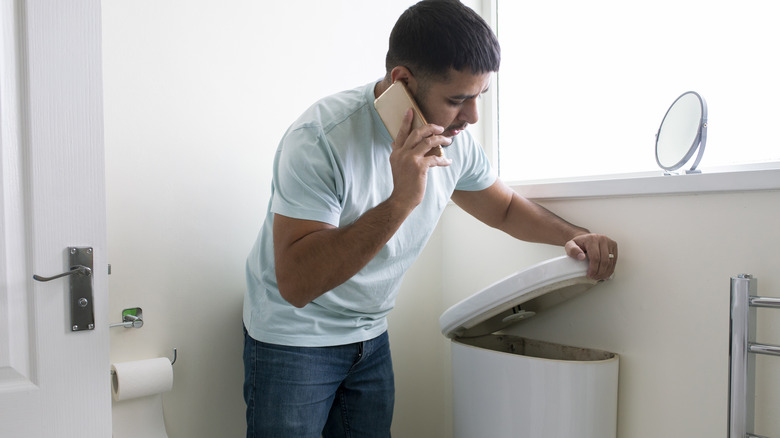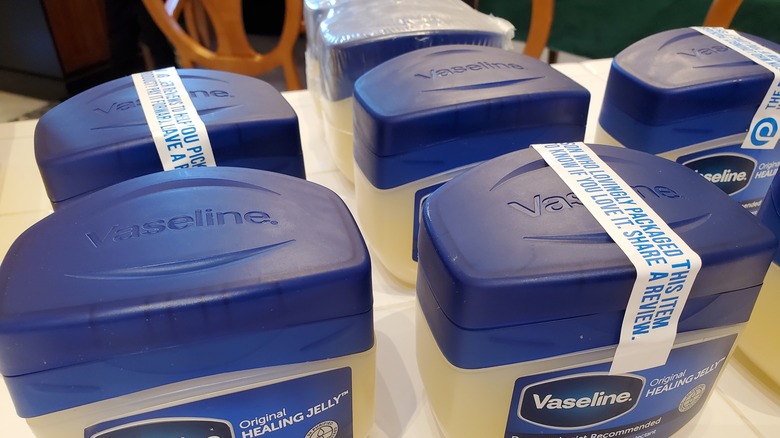The Quick-Fix Solution To A Worn Toilet Flapper Is In Your Medicine Cabinet
We may receive a commission on purchases made from links.
Your toilet is running non-stop, and an enormous water bill is the last thing you need. You know your toilet flapper is the problem, but adding a plumbing bill to repair a running toilet to your monthly budget is equally far from appealing. Here's a weird tip you'd have probably never thought of unless someone told you. Rub petroleum jelly (also known by the name of the most popular brand — Vaseline) all over the flapper. Yup, you read that right. It's not a solution designed for longevity. However, it will ensure your toilet keeps working if you don't have the funds, inclination, or emergency excuse to get a plumber over to your house to replace the worn flapper.
Flappers are vital to the optimal function of your toilet's plumbing system. They're in the tank, right above the flush valve and pipe connecting the tank to the bowl. When you push the flush button or pull the lever, they open, letting just the right amount of water into the bowl, washing away your waste. The material they're made of — typically synthetic rubber — doesn't last forever. With exposure to harsh cleaning products, the plastic deteriorates over time, allowing water to leak through. Petroleum jelly is made of hydrocarbons sourced from fossil fuels and is highly water-resistant — synchronized swimmers use Vaseline to keep their makeup on during a competition.
Go shopping for petroleum jelly
To take advantage of one of the handiest ways to use Vaseline around the house, you'll need some petroleum jelly. Using the one from your medicine cabinet is okay, provided you're willing to sacrifice it to the toilet now and forever. If not, you'll need to buy a new tub, and a 13-ounce container of Vaseline will set you back $5.48 at Walmart. Of course, it doesn't have to be Vaseline specifically. Any off-brand petroleum jelly product will likely work just as well. Get 2.2 pounds of USP-grade petroleum jelly for $17.00 from Veda Oils, while SoapGoods.com sells 1 pound of petroleum jelly, also USP-grade, for $10.56. So long as the product resists water, it will do the job.
Hygiene is essential here, no matter how often you clean your toilet. It's recommended to wear a pair of long rubber gloves to protect yourself from bacteria (and your skin from harsh cleaning chemicals, if they are present). Put on a mask if you prefer; you'll be bending over the toilet for this job. It's better to use an old spoon or spatula to scoop out the Vaseline — make sure it doesn't go back into rotation in your kitchen. As mentioned, the tub of Vaseline is now dedicated to this purpose, too. Write "toilet flapper" or a similar note on the outside of the container with a permanent marker so you and your family don't forget and accidentally use it for other purposes, and store it with your scooping implement.
Coat the flapper in goop
The toilet flapper is an essential part of your toilet you probably aren't cleaning enough as it is. So, first things first, give it, the tank, and maybe even the bowl a thorough clean. Stop the water supply to the toilet and drain all the water out of the tank. Unhook the flapper at the hinges and detach it from the toilet lift chain. Soak it in an old bowl filled with a vinegar-water solution. This will clean off any mineral and rust deposits that might be affecting the seal. Leave it to dry; only apply the petroleum jelly once the flapper — and the cleaned toilet tank — are entirely moisture-free. Any leftover water may break the seal you're trying to create.
Scoop a pea-sized ball of petroleum jelly out of the jar using your spoon or spatula. Smear it onto the seal around the seal of the flush valve — rub it in with a gloved finger. Do the same to the flapper and wipe off any excess with a rag. Re-attach the flapper to its hinges and the chain, and turn on the water supply. Put the lid back on once and test the toilet by flushing it. If the water stops flowing down the bowl when the tank is empty, celebrate your success!

